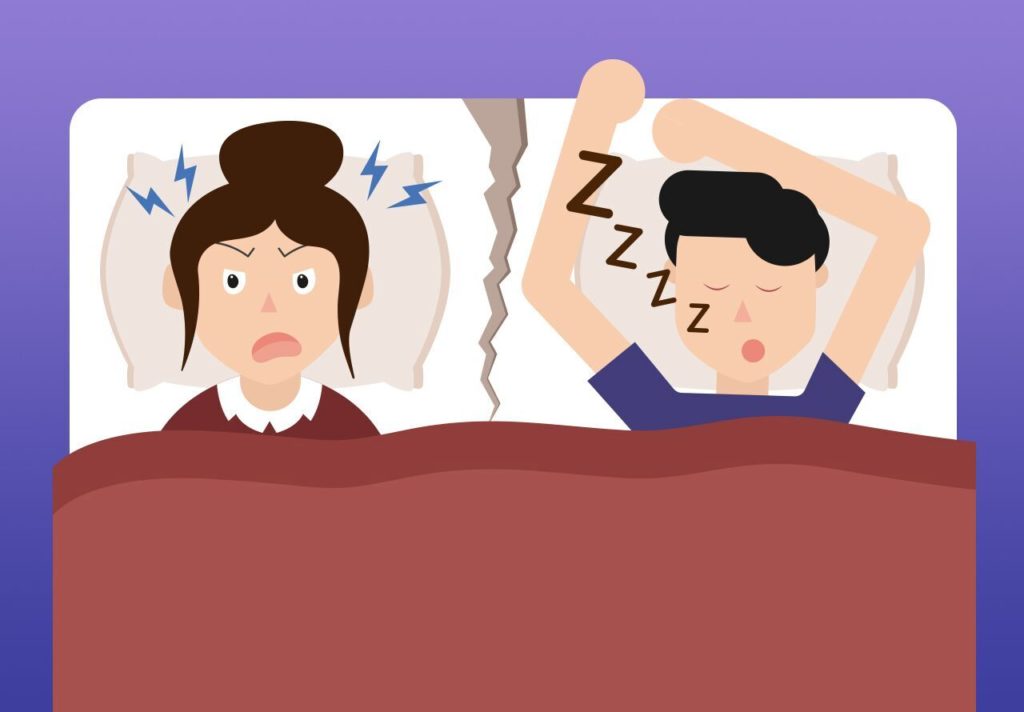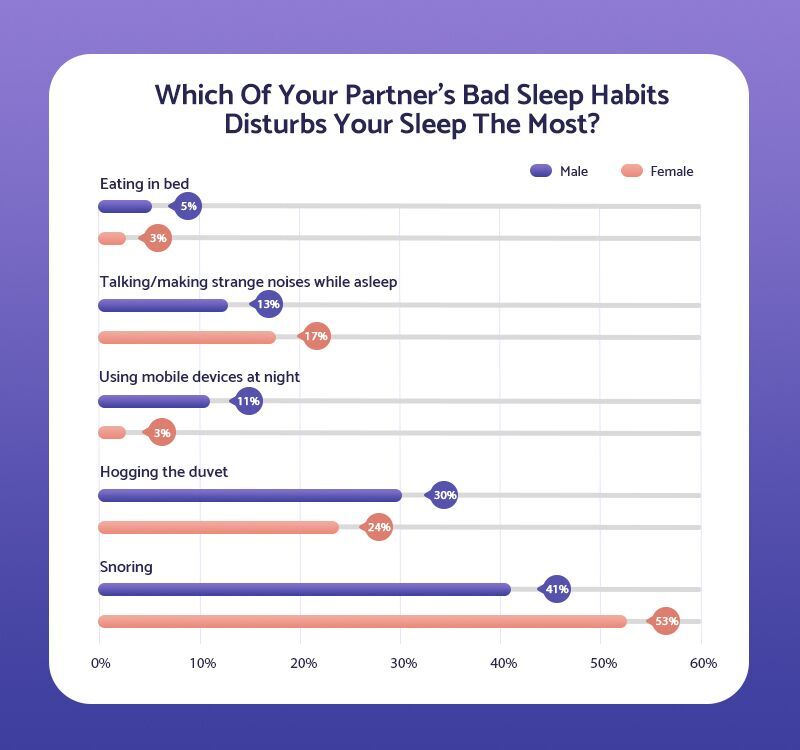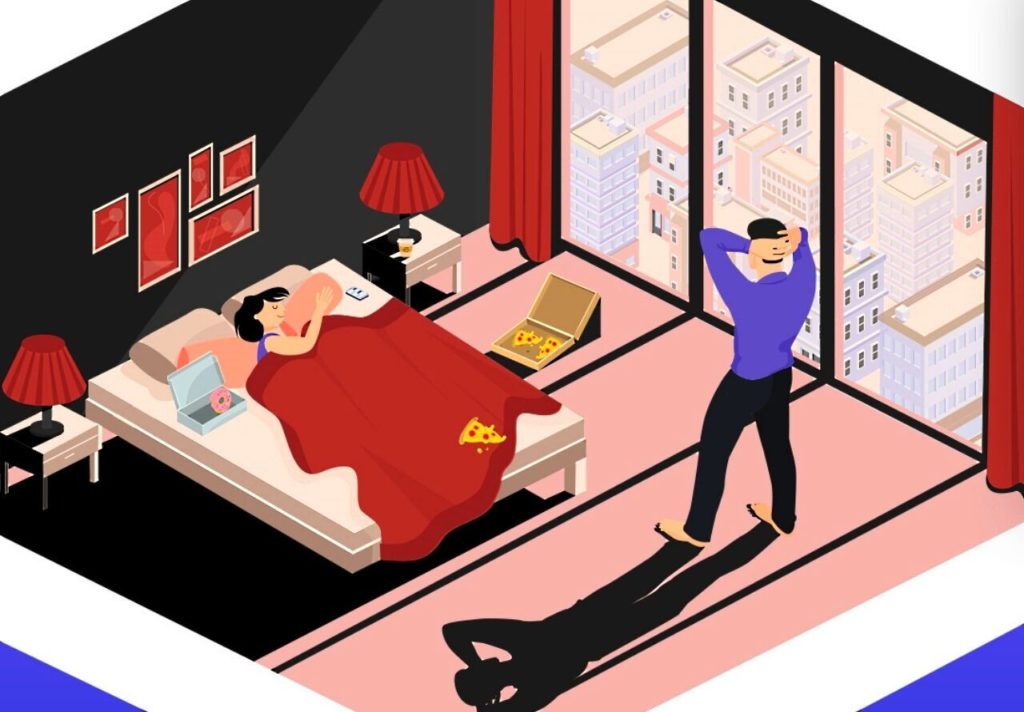The ability to sleep soundly varies from person to person. Often, the cause of our sleeplessness is the person we share a bed with. You might be in love, married and get on like a house on fire with your partner during the day, but when it’s time to call it a night, they could be driving you mad.
More and more couples are reaching their limit and opting for a ‘sleep divorce’ to ensure they’re getting enough sleep. When it’s time to turn in, they head to separate beds. We surveyed the British public to see what annoying habits from their partner were interrupting their sleep. Here are our key findings:
27% of Brits are kept awake every night by their partner’s bad bedtime habits
1/2 of our respondents ranked snoring as the main cause of nighttime tension with 25% citing it as the most common cause of arguments with their partner
After 11 years together, 66% of people would consider sleeping in separate beds
42% of Brits are getting less than the recommended 7 hours of sleep per night
1/3 of respondents don’t go to bed at the same time as their partner
Find out what’s keeping people up at night below and see if you have grounds for a sleep divorce with our compatibility test.
The UK’s bad sleeping habits
There are plenty of bad sleep habits keeping Brits awake. These range from the dreaded snorer to those who fill the room with light and sound from their mobile devices. Let’s take a look at how gender affects people’s opinion of these behaviours:
With all these bad habits to contend with, it’s no wonder almost 1/4 of respondents would consider sleeping in a separate bed to their partner for a good night’s sleep.
Our research has found that men complain more about people eating in bed, going on their mobile device and hogging the duvet. Women are more likely to be annoyed by partners that snore and talk in their sleep.
Half of our respondents ranked snoring as the main cause of bedtime tension. This is unsurprising as 25% of people surveyed cited it as the most common reason for arguments with their partner. In fact, it is almost on par with rows caused by people’s love-life (26.8%). The results have highlighted the importance of good sleeping etiquette in relationships.
The 11-year itch: when couples file for sleep divorce
Now that we know that bedrooms in the UK aren’t the restful oasis we all crave come bedtime, how long do people stick it out before suggesting they go their separate ways to slumber?
Over 1/3 of respondents don’t go to bed at the same time as their partner. This can lead to incompatibility with each other’s sleep cycles – especially over an extended period of time.
According to our survey, 11 years of this is when people reach their limit. 2/3 of respondents classed this as the point when sleep divorce becomes a real possibility.
The negative health effects caused by inconsiderate sleeping partners
A shocking 42% of Brits are getting less than the recommended 7 hours of sleep per night. This is supported by research from the British Sleep Council. They found that people in the UK sleep an average of just 6 hours and 35 minutes per night.
Our survey results show that this can be directly traced to the annoying habits of their partners. While it may seem more like an inconvenience than a relationship deal breaker to share a bed with someone that exhibits one or more of these aggravating behaviours, it can become a serious problem.
27% of Brits are kept awake by their partner’s annoying sleep habits every single night. 28% suffer from these issues at least once a week. This can negatively affect everything from mental health to work performance, all because of an inconsiderate bunkmate.
Problems caused by lack of sleep
Weight gain: If you’re not getting the right amount of shuteye, the chemicals that signal when you’re full don’t function properly. This leaves you more likely to overindulge – even when you’ve eaten enough.
Low sex drive: A lack of sleep affects libido in both men and women. Males are believed to suffer a drop in their testosterone levels if they don’t get enough nightly rest.
Memory issues: Sleep helps your brain form connections to help you remember and process new information. If you’re missing out, it can impact your short and long-term memory.
Mood swings: If you’re sleep deprived, it can lead to rapid changes in your mood, making you emotional and quick-tempered. When this isn’t addressed, it can lead to more serious conditions such as anxiety and depression.
Trouble concentrating and poor balance: Your concentration, problem-solving skills and balance rely on your brain being fully rested. If you frequently don’t get enough sleep, you increase the risk of being involved in accidents.
Weakened immune system: When you don’t get the rest you need; your immunity is lowered against viruses like flu and the common cold. This increases the likelihood of you getting ill.
High blood pressure and heart disease: People who sleep less than five hours a night risk raising their blood pressure. If left unchecked, this can cause internal inflammation and lead to serious conditions such as heart disease.
Increased risk of diabetes: Sleep affects the way your body releases insulin. Those who aren’t getting the correct amount of sleep have higher blood sugar levels. They also have a greater risk of contracting type 2 diabetes.
Do you have grounds for sleep divorce?
If your partner displays one or more of the bad habits described above, it could be the case that you’re on the slippery slope towards a sleep divorce. When your physical and mental health, not to mention the relationship itself could be at stake – it’s worth finding out whether or not you would benefit from separate sleeping arrangements.
Take our sleep compatibility test to see if you’re living in ‘sleep harmony’, require ‘sleep counselling’ or have ‘grounds for sleep divorce’.
For more information on the importance of a good night’s sleep, what’s keeping Brits awake at night and how work can affect your ability to relax – visit the Mattress Online blog.


